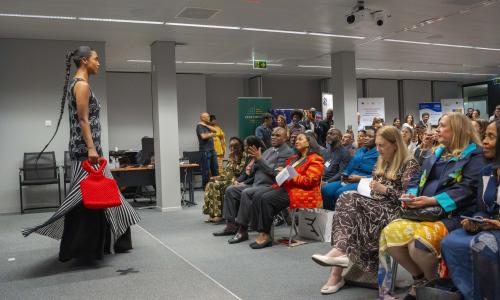Stessy Lorrain Kaze is a Public Health Specialist and President of AfriYAN Burundi—a youth-led network championing adolescent health and gender equality. She spoke to Africa Renewal’s Zipporah Musau about her journey into Public Health and advocacy:
You have made your mark in the field of Public Health and youth advocacy, particularly in Burundi. For readers who may not yet know you, how would you describe your personal journey and what fuels your commitment to youth and adolescent health?
My journey began with a deep desire to see young people, especially girls, live healthy, empowered lives.
Growing up in Burundi, I witnessed firsthand the challenges adolescents face in accessing health services, education, and opportunities. This fueled my passion for public health and youth advocacy.
I pursued studies in Public Health and became actively involved in youth networks, eventually leading AfriYAN (African Youth and Adolescent Network) Burundi.
What drives me is the belief that when young people are informed, empowered, and supported, they become unstoppable agents of change.
As President of AfriYAN Burundi, you lead a network that champions the rights and well-being of young people. What makes your organization’s approach to youth engagement and sexual and reproductive health unique, and how are you creating lasting impact at the community level?
AfriYAN Burundi is more than a youth network—it’s a movement.
What makes our approach unique is that we don’t just speak for young people; we work with them, in their communities, to co-create solutions. We focus on sexual and reproductive health, gender equality, and youth leadership.
Our peer education model, community dialogues, and partnerships with local leaders ensure that our impact is both grassroots and sustainable.
We’re not just raising awareness—we’re shifting mindsets and building systems that support youth well-being long-term.
At this year’s UN High-Level Political Forum, you represented youth voices from Africa. What key message or advocacy point did you bring to the global stage, and what do you hope leaders take away from it?
At the UN High-Level Political Forum, I had the honour of bringing the voices of African youth to the global stage. My key message was clear: youth are not just beneficiaries of development; they are partners and leaders.
I emphasised the urgent need for investment in adolescent health, education, and economic empowerment, especially in the context of the Sustainable Development Goals (SDGs).
I urged leaders to move beyond promises and take bold, youth-centered action.
We, the young people, are ready to lead; we just need the space and support to do so.
Finally, what is your message to young Africans—especially adolescent girls and boys facing health, education, and economic challenges in their communities?
To every young African, especially adolescent girls and boys facing challenges: I want you to know that your voice matters, your dreams are valid, and your future is worth fighting for.
Don’t let your circumstances define your potential.
Young people should seek knowledge, speak up, and support one another.
And to our leaders: listen to us, invest in us, and walk with us.
The future of Africa depends on how we treat its youth today.







